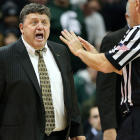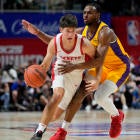Greg Kampe almost died last month.
He's OK now, mostly.
So don't be alarmed. But he for real almost died last month -- even if, at first, he just figured he was freezing inside the Riverview Park Activities Center like every other college coach at Nike's Peach Jam.
"I thought I was getting a cold because it's so cold in the gym," Oakland's basketball coach told me by phone.
Pretty quickly, though, he realized it was something more.
But let's back up.
I'll get back to Peach Jam momentarily. But, first, let me back up to March 14 -- when Oakland won 74-69 at Clemson in the opening round of the NIT. Kampe was in what he described as "excruciating pain" after the victory. He recognized it as kidney stones because he has a long history with kidney stones. So he flew back home and went to the hospital. Two hours later, he was in surgery.
"But they couldn't get the stone," Kampe said.
Consequently, doctors put in a stent and decided to try again two weeks later. That time, they got the stone. But in the process they found another issue -- specifically a "very large stone stuck inside the kidney," Kampe said. Only way to remove it, doctors determined, was to do surgery through his back. But Kampe wanted to put the surgery off until after the July Evaluation Period. So it was scheduled for Aug. 1.
Which brings us back to Peach Jam.
It was Friday night, July 14, and Kampe wasn't feeling well. But, again, he thought he had just caught a cold because it's always ridiculously cold inside the facility. So the games ended that night and Kampe, like lots of coaches, decided to drive to Atlanta so he could spend Saturday at an Under Armour event. He got to Atlanta, went to sleep, woke up the next morning and felt even worse. But he still made it to the gym.
"So I'm watching the first game, and I can't stand up," Kampe said. "My assistant, Dan Hipsher, is there. And he sees me and says, 'Are you alright? Because your face is yellow. You're yellow.' "
At this point, Kampe realized that getting through another day of evaluating prospects was impossible. So he changed his flight and headed to Hartsfield-Jackson Atlanta International Airport to fly home early. By the minute, he grew more uncomfortable. By the minute, he felt worse. But he eventually made it home, somehow. And that's when the shaking started.
"The best way to describe it is when a kid is 6 or 7, and he gets out of the pool, and he's in a towel, and he's just shaking," Kampe said. "That's what I was doing -- uncontrollably shaking."
Like a child just out of the pool, Kampe thought maybe he was simply cold. So he climbed into his hot tub. The temperature was set at 104 degrees. He sat there for a little while. But nothing changed. His body was still shaking.
"So then I went to the hosptial," Kampe said. "And that's what saved my life. If I don't go to the hospital right then, I don't make it through the night."
While at the hospital, before everything was figured out, Kampe said he started convulsing. His temperature had risen to 106.7 degrees -- the result of the stone that was inside his kidney and scheduled to be removed Aug. 1 becoming infected. The infection had spread throughout his kidney. Then the kidney started failing. And Kampe developed sepsis -- a rare complication of an infection that can lead to tissue damage, organ failure and ... death.
"At my age, I was told, 80 percent of people who get sepsis die," said Kampe, who is 61. "They actually asked if I wanted to see a priest. That's when I knew how serious it was. They asked if I wanted to see a priest."
The fact that Kampe is telling this story means Kampe lived to tell this story, in part because doctors hosed him down with ice-cold water -- like literally sprayed his body with a hose -- to quickly lower his temperature from 106.7 degrees to around 102 degrees. He was in intensive care for five days. And he had surgery a week after being released from IC, at which point doctors removed six infected stones from his kidney.
"I'm lucky to be alive," Kampe said. "But I'm alive."
Kampe was hesitant to share this story for a couple of different reasons -- mostly because he doesn't want to be portrayed as a sympathetic figure but also because "Oakland's coach almost died" is a headline that could, knowing this business, lead to negative recruiting. But ultimately he decided to share his story, and here's why: Kampe wants others to learn from it.
"I've had several people come up to me and tell me their brother or father went through a similar thing but didn't go to the hospital," Kampe said. "They just went to bed and then never woke up. People, especially men, and especially men in athletics, always think their bodies are invincible. We always think we'll just wake up tomorrow and feel better. But it's important to go to the hospital. If I wouldn't have gone to the hospital, I wouldn't have made it. The only reason I'm still alive is because I went to the hospital."

















